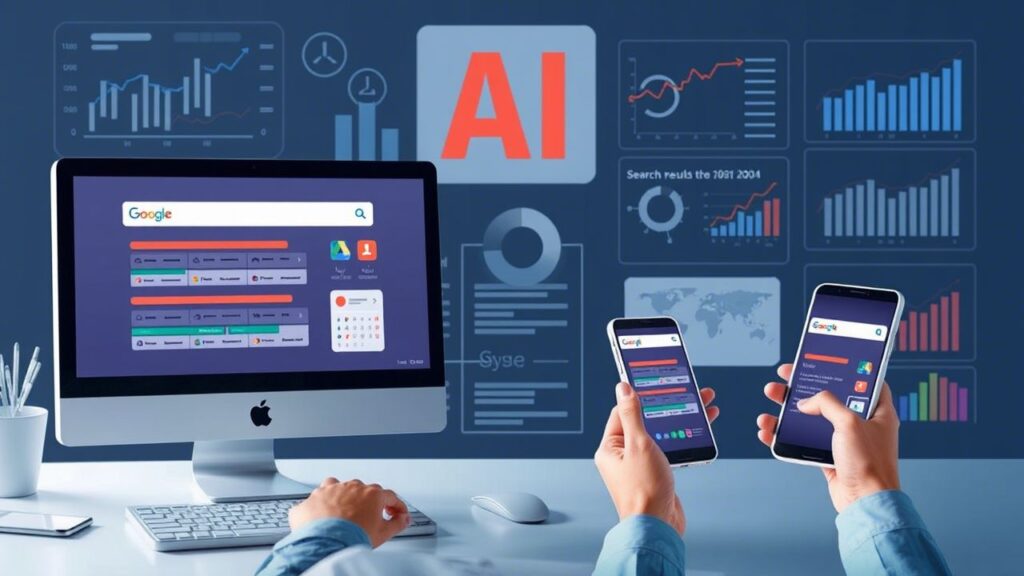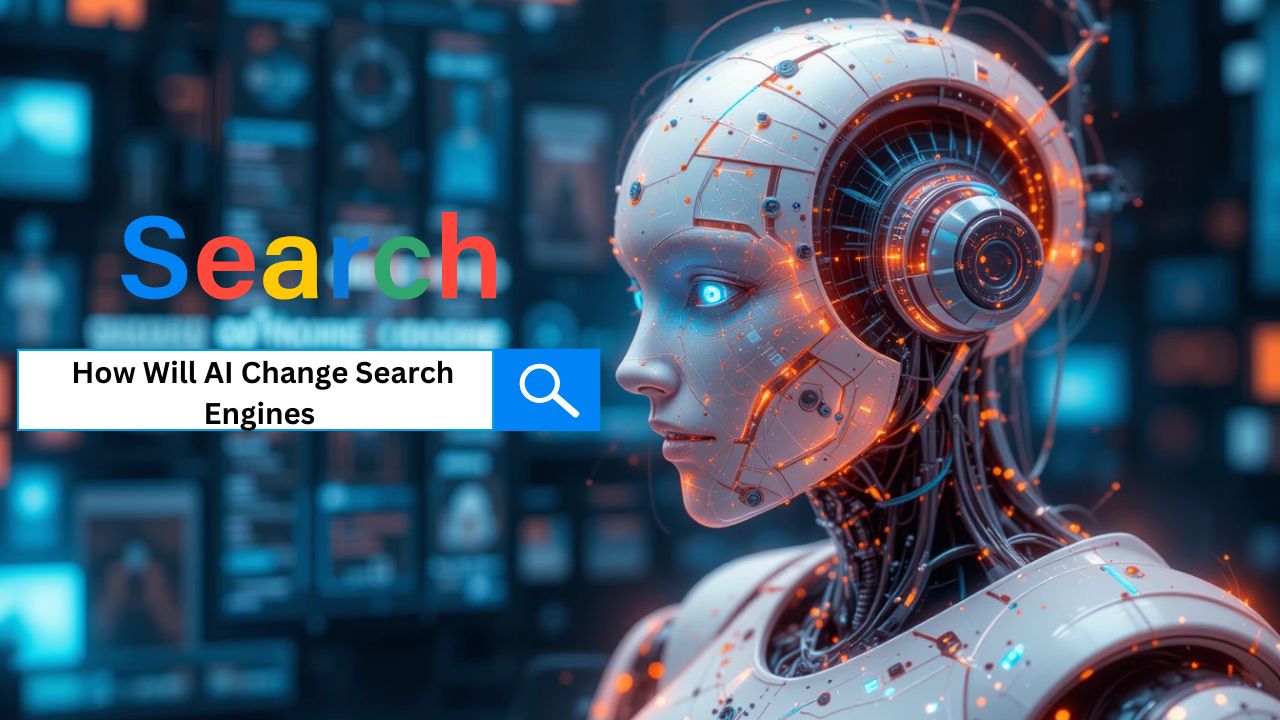How AI Will Transform Search Engine Algorithms
How Will AI Change Search Engines? Artificial Intelligence (AI) is poised to revolutionize the way search engines operate. As technology advances, AI will not only enhance search results but also redefine user experiences. Here’s how AI is expected to transform search engine algorithms.
Improved Understanding of User Intent
Traditional search engines rely heavily on keywords to deliver results. However, AI can go beyond this by understanding the context and intent behind a query. For instance, if a user searches for “best pizza place,” AI algorithms can differentiate between a request for a restaurant review and a search for a pizza recipe. This nuanced understanding ensures that users receive more relevant and personalized results.
| Search Query | Traditional Approach | AI-Powered Approach |
|---|---|---|
| Best pizza place | Generic listings of pizza places | Contextual results based on user intent (reviews, recipes) |

Enhanced Personalization
AI can analyze vast amounts of data to tailor search results to individual preferences. By considering factors like previous search history, location, and time of day, AI can provide customized results. For example, if a user frequently searches for fitness tips in the morning, the search engine can prioritize content related to morning workouts or breakfast options. This personalization makes the search experience more efficient and satisfying for users.
- Previous search history
- User location
- Time of day
Real-Time Updates and Trends
How Will AI Change Search Engines? AI enables search engines to stay updated with real-time information and trending topics. Unlike traditional search algorithms that might take hours or days to update content, AI can instantly incorporate new data. This capability is particularly beneficial during events like elections, natural disasters, or viral trends. Users can expect the most current and relevant information at their fingertips, enhancing the overall utility of search engines.
Conversational Searches
With the rise of voice assistants and chatbots, conversational searches are becoming increasingly common. AI algorithms can understand and process natural language queries, making interactions more intuitive. For example, instead of typing “weather forecast,” a user can ask, “What’s the weather like today?” AI can then parse the question and provide an accurate answer. This shift towards conversational interfaces is expected to become more prevalent as AI continues to evolve.
| Type of Search | Traditional Approach | AI-Powered Approach |
|---|---|---|
| Text-based search | Keyword matching | Natural language processing |
| Voice-based search | Limited support | Full integration with conversational queries |
Visual and Multimodal Searches
AI also enhances the ability to perform visual and multimodal searches. Instead of relying solely on text inputs, users can upload images or videos to find related content. For instance, a user looking for fashion inspiration can upload a picture and receive suggestions for similar outfits. This multimodal approach caters to diverse user needs and preferences, making search engines more versatile and user-friendly.
- Image uploads
- Video uploads
- Multimodal queries
Advanced Analytics and Insights
How Will AI Change Search Engines? AI can provide deeper analytics and insights into search behavior. By analyzing patterns and trends, AI algorithms can offer valuable insights to both users and businesses. For example, businesses can track consumer preferences and adjust their marketing strategies accordingly. Additionally, users can gain access to detailed analytics about their search habits, helping them refine their queries for better results.
- Pattern analysis
- Trend tracking
- Behavioral insights
Challenges and Considerations
While AI brings numerous benefits, there are challenges to consider. Privacy concerns arise as AI systems collect and analyze vast amounts of user data. Ensuring data security and maintaining user trust is crucial. Additionally, there’s a risk of over-personalization leading to echo chambers where users only see information that aligns with their existing beliefs. Balancing personalization with diversity in search results is essential to prevent these issues.
- Data privacy concerns
- Maintaining user trust
- Avoiding echo chambers
AI is set to significantly transform search engine algorithms, offering improved understanding of user intent, enhanced personalization, real-time updates, conversational searches, visual and multimodal capabilities, and advanced analytics. While challenges exist, the potential benefits make AI an invaluable tool in the evolution of search engines. As AI continues to advance, we can expect even more innovative features that enhance the user experience.
The Role of Machine Learning in Enhancing Search Personalization
Machine learning is revolutionizing how search engines function, particularly in enhancing search personalization. By understanding user preferences and behavior, search engines can deliver more relevant results tailored to individual needs. This technology analyzes vast amounts of data to predict and cater to users’ interests, making searches faster and more effective.
Understanding User Behavior
How Will AI Change Search Engines? One of the key roles of machine learning in search personalization is understanding user behavior. Search engines collect data on various interactions, including search history, time spent on a page, and click-through rates. Machine learning algorithms process this data to identify patterns and preferences. For instance, if a user frequently searches for recipes, the algorithm learns to prioritize culinary-related content in future searches.
Data Collection Methods
- Search History: Analyzing past queries to understand user interests.
- Click-Through Rates: Tracking which links users prefer to visit.
- Time Spent: Measuring how long users spend on different pages.
- Geolocation Data: Using location to provide contextually relevant results.
Improving Relevance with Machine Learning
Machine learning algorithms improve relevance by continuously refining search results based on user feedback. When users interact with search results—clicking, sharing, or bookmarking certain pages—the system learns from these actions. Over time, the algorithms adjust, offering more personalized and accurate results. This iterative process ensures that the search experience becomes increasingly tailored to each user’s unique needs.
Algorithmic Adjustments
- Ranking Algorithms: Adjusting the order of search results based on user interaction.
- Content Filtering: Removing irrelevant content and highlighting useful information.
- Contextual Relevance: context like time, location, and device type into search results.
The Impact on Search Engine Performance
How Will AI Change Search Engines? Enhanced personalization through machine learning significantly improves search engine performance. Users experience faster and more accurate results, leading to higher satisfaction and engagement. Additionally, businesses benefit from increased visibility among targeted audiences, optimizing their marketing efforts and reaching potential customers more effectively.
Performance Metrics
| Metric | Description |
|---|---|
| Click-Through Rate (CTR) | Percentage of users who click on a link after seeing it in search results. |
| Bounce Rate | Percentage of users who leave a site after viewing only one page. |
| Average Session Duration | Length of time users spend interacting with search results. |
Challenges and Future Prospects
Despite the benefits, machine learning in search personalization faces challenges. Privacy concerns arise as users may feel uncomfortable with the extent of data collection. Balancing personalization with privacy is crucial. Moreover, the continuous improvement of algorithms requires substantial computational resources and ongoing research. However, advancements in technology are expected to address these issues, leading to even more sophisticated and user-friendly search experiences.
Privacy Considerations
- Data Security: Ensuring collected data is secure and protected against unauthorized access.
- User Consent: Obtaining explicit permission before collecting and analyzing user data.
- Transparency: Clearly communicating how data is used and providing options for opting out.
Machine learning plays a pivotal role in enhancing search personalization, transforming how search engines operate. By leveraging user behavior data and continuously refining algorithms, search engines offer increasingly relevant and personalized results. While challenges exist, ongoing technological advancements promise a future where personalization and privacy coexist harmoniously, delivering superior search experiences for all users.
Voice Search and Its Dependence on AI Advancements
Voice search is becoming increasingly popular as technology advances, particularly with the integration of artificial intelligence (AI). As users seek more convenient ways to interact with their devices, voice search provides a hands-free experience that enhances accessibility and efficiency. However, the effectiveness of voice search heavily relies on AI advancements, which continuously improve its accuracy and functionality.
Understanding Voice Search
How Will AI Change Search Engines? Voice search allows users to perform searches through spoken commands rather than typing queries into a search engine. This feature is available on various devices, including smartphones, smart speakers, and other connected home devices. The key advantage of voice search lies in its ability to mimic human interaction, making it easier for people to find information quickly and efficiently.
How Voice Search Works
When a user speaks a query into their device, the audio is captured and converted into text through a process called speech recognition. This involves breaking down the spoken words into smaller units, analyzing them, and converting them into written form. Once the text is recognized, the search engine processes the query and returns relevant results. This entire process happens almost instantaneously, providing users with quick access to the information they need.
The Role of AI in Speech Recognition
Speech recognition is a complex task that requires sophisticated algorithms to accurately interpret spoken words. AI plays a crucial role in enhancing the accuracy and reliability of speech recognition systems. Machine learning algorithms, a subset of AI, are trained on vast amounts of data to recognize patterns and nuances in human speech. This training enables the system to understand different accents, dialects, and speaking styles, thereby improving its overall performance.
| Technology | Description |
|---|---|
| Natural Language Processing (NLP) | A subset of AI that helps machines understand human language. |
| Machine Learning (ML) | Enables systems to learn from data and improve over time. |
| Deep Learning | A type of machine learning that uses neural networks to simulate human decision-making. |
Natural Language Processing (NLP)
How Will AI Change Search Engines? Natural Language Processing (NLP) is another critical component of voice search. NLP focuses on enabling machines to understand and interpret human language in a way that mimics human comprehension. This technology helps voice search systems comprehend the intent behind spoken queries, even when they are phrased ambiguously. For example, a query like “What’s the weather like today?” can be understood as a request for current weather conditions, thanks to NLP algorithms.
Improvements in Accuracy
As AI continues to evolve, so does the accuracy of voice search. Recent advancements have led to significant improvements in understanding complex queries and handling multi-turn conversations. For instance, voice assistants can now follow up on previous questions, maintain context across multiple interactions, and provide more personalized responses. These enhancements not only make voice search more reliable but also more intuitive for users.
Personalization and Contextual Understanding
Personalization is another area where AI has made substantial strides in voice search. By analyzing a user’s past interactions and preferences, voice assistants can deliver more tailored results. For example, if a user frequently asks about local restaurants, the system can remember this preference and prioritize restaurant-related queries. Additionally, contextual understanding allows the system to grasp the broader context of a conversation, leading to more accurate and relevant responses.
Challenges and Future Prospects
Despite the progress made, voice search still faces several challenges. One major issue is the variability in human speech, which can be influenced by factors such as regional accents, speaking speed, and ambient noise. Addressing these challenges requires continuous refinement of AI models and larger datasets for training. Another challenge is ensuring privacy and security, especially when dealing with sensitive information shared through voice commands.
Emerging Trends
- Multi-modal Interaction: Combining voice with other input methods, such as touch or gesture, to enhance user experience.
- Context-Aware Systems: Developing systems that can understand and respond to context in real-time, providing more seamless interactions.
- Edge Computing: Leveraging edge computing to process data locally, reducing latency and improving responsiveness.
Impact on User Experience
How Will AI Change Search Engines? The integration of AI in voice search is transforming the way users interact with technology. It offers a more natural and intuitive method of communication, making digital devices more accessible and user-friendly. Users can now perform tasks with greater ease, whether it’s searching for information, controlling smart home devices, or managing daily routines. This shift towards voice-based interactions is likely to continue growing as AI technologies become even more sophisticated.
Future Implications
Looking ahead, the future of voice search appears promising. With ongoing research and development, we can expect further improvements in accuracy, personalization, and contextual understanding. Voice search may become an even more integral part of our daily lives, seamlessly integrating into various aspects of work, education, and entertainment. As AI continues to advance, voice search will undoubtedly play a pivotal role in shaping the future of human-computer interaction.

Voice search is deeply intertwined with AI advancements, and its evolution is driven by continuous improvements in speech recognition, natural language processing, and contextual understanding. As these technologies mature, voice search will become increasingly accurate, personalized, and user-friendly, paving the way for a new era of human-computer interaction.
The Impact of AI on SEO Strategies in the Coming Years
As technology evolves, the integration of artificial intelligence (AI) into various industries continues to reshape traditional practices. One area where AI’s impact is particularly profound is in the realm of search engines and SEO strategies. In the coming years, AI is expected to revolutionize how search engines function and how businesses optimize their online presence. Here’s a detailed look at the anticipated changes and how they will affect SEO strategies.
Enhanced User Experience Through Personalization
How Will AI Change Search Engines? AI algorithms are becoming more adept at understanding user behavior and preferences. This enhanced capability allows search engines to deliver more personalized results. For instance, Google’s BERT (Bidirectional Encoder Representations from Transformers) algorithm already processes natural language more effectively, understanding the context behind queries better than ever before. In the future, expect AI to further refine these capabilities, leading to more tailored search results based on individual user profiles. This shift necessitates SEO professionals to focus more on creating content that resonates with specific audience segments, rather than generic content that targets broad demographics.
Improved Search Intent Understanding
With AI, search engines can delve deeper into understanding the intent behind a query. This means that search algorithms will increasingly prioritize content that not only matches keywords but also aligns with the user’s actual needs. For example, if a user searches for “best pizza places,” the AI might consider factors like location, recent reviews, and even dietary preferences. SEO strategies must evolve to ensure content not only includes relevant keywords but also addresses the underlying intent. Content creators should aim to provide comprehensive answers that fulfill the user’s expectations, thereby increasing the likelihood of ranking higher in search results.
Increased Importance of Quality Content
How Will AI Change Search Engines? AI-driven search engines are likely to penalize low-quality content more rigorously. As AI becomes smarter, it will be able to detect thin, duplicate, or irrelevant content more easily. This development underscores the importance of producing high-quality, valuable content that engages users and keeps them on the site longer. Businesses will need to invest in content that provides genuine value, whether through in-depth articles, multimedia content, or interactive elements. Additionally, ensuring that content is regularly updated and remains relevant will become crucial in maintaining good search engine rankings.
Dynamic and Adaptive SEO Tactics
AI will enable search engines to adapt quickly to new trends and shifts in user behavior. This adaptability means SEO strategies will need to be more dynamic and responsive. For example, real-time analysis of trending topics and emerging keywords could help businesses stay ahead of the curve. SEO professionals might leverage AI tools to monitor and analyze user interactions, search patterns, and emerging trends, allowing them to adjust their strategies in near real-time. This agility will be key to staying competitive in a rapidly changing digital landscape.
Impact on Technical SEO
Technical SEO involves optimizing website infrastructure and coding to enhance search engine performance. AI is set to play a significant role here as well. Advanced AI tools can identify and resolve technical issues more efficiently than manual checks. For instance, AI can automate the detection of broken links, slow loading times, and mobile responsiveness issues. This automation not only saves time but also ensures that websites remain optimized continuously. SEO teams will need to integrate AI-driven tools into their workflows to maintain a competitive edge in technical SEO.
Emerging Technologies and Their Influence
How Will AI Change Search Engines? Alongside AI, other emerging technologies like machine learning and natural language processing (NLP) will continue to influence SEO strategies. Machine learning algorithms can predict user behavior and tailor search results accordingly, while NLP helps in better understanding and interpreting human language. Businesses should prepare for a future where these technologies become standard features in search engines, requiring continuous adaptation and innovation in their SEO strategies.
Content Optimization Beyond Keywords
Traditionally, SEO has focused heavily on keyword optimization. However, with AI, the emphasis will shift towards broader content optimization. AI can analyze vast amounts of data to determine which types of content perform best under different conditions. SEO professionals should focus on creating content that is engaging, informative, and aligned with user intent. This might involve incorporating multimedia elements, interactive features, and other innovative approaches to content creation.
SEO Strategies for Voice Search
Voice search is becoming increasingly popular, driven by advancements in AI and NLP. AI-powered voice assistants like Siri and Alexa are now capable of understanding and responding to complex queries. SEO strategies will need to adapt to this trend by optimizing content for voice search. This involves crafting conversational, natural language queries and ensuring that content is easily digestible and answer-oriented. Businesses should consider creating FAQ sections, how-to guides, and other content formats that address common questions users might ask via voice search.
The integration of AI into search engines will undoubtedly transform the SEO landscape in the coming years. By focusing on enhancing user experience, understanding search intent, producing quality content, adopting dynamic tactics, and leveraging emerging technologies, businesses can stay ahead of the curve. Embracing these changes will not only improve search engine rankings but also ensure a more engaging and satisfying experience for users.
Ethical Considerations in AI-Powered Search Engines
In the rapidly evolving landscape of technology, artificial intelligence (AI) has become a cornerstone in enhancing search engine capabilities. As AI integrates more deeply into these systems, it brings forth a range of ethical considerations that must be addressed to ensure responsible and fair usage. These considerations span privacy concerns, bias and discrimination, transparency, accountability, and the potential impact on human employment.
Privacy Concerns
How Will AI Change Search Engines? One of the foremost ethical challenges with AI-powered search engines is the issue of privacy. Search engines collect vast amounts of data on user behavior, preferences, and personal details. This data can include browsing history, search queries, location data, and even social media interactions.
While this information helps tailor search results to individual users, it also raises significant privacy concerns. Users may feel their privacy is invaded if they are unaware of how their data is being used and who has access to it. Implementing robust data protection measures, transparent privacy policies, and giving users control over their data are essential steps to mitigate these issues.
| Data Type | Examples | Risks |
|---|---|---|
| Browsing History | Visited websites, time spent on each page | Potential for profiling and targeted advertising |
| Search Queries | Keywords and topics searched | Possible misuse for surveillance purposes |
| Location Data | Current and past locations | Risk of unauthorized tracking and monitoring |
| Social Media Interactions | Posts, likes, comments | Concerns about data breaches and identity theft |
Bias and Discrimination
Another critical ethical consideration is the potential for AI algorithms to perpetuate or even exacerbate biases and discrimination. Search engines rely heavily on machine learning algorithms to process and analyze large datasets. If these datasets contain inherent biases—such as gender, racial, or socioeconomic biases—the algorithms can amplify these biases in their outputs.
For example, a job search algorithm might inadvertently favor candidates from certain demographic groups based on historical hiring patterns. To address this, developers must ensure that training data is diverse and representative. Regular audits and adjustments to algorithms can help identify and correct biases.
- Ensure training data is diverse and representative
- Conduct regular audits and adjustments to algorithms
- Implement bias detection tools
Transparency
Transparency in how AI algorithms operate is crucial for maintaining trust among users. When search results appear, it is often unclear why certain items are prioritized over others. This lack of transparency can lead to mistrust and skepticism. Users should have a clear understanding of how their data influences search outcomes and what factors contribute to the ranking of results. Providing explanations and offering users the ability to understand and challenge search results can enhance transparency. Open-source models and detailed documentation can also play a vital role in fostering transparency.
- Provide clear explanations for search result rankings
- Allow users to understand and challenge search results
- Utilize open-source models and detailed documentation
Accountability
As AI systems become more sophisticated, so does the need for accountability. When an AI-powered search engine makes a mistake or produces harmful results, it is essential to determine who is responsible. Developers, companies, and regulatory bodies must establish clear guidelines and mechanisms for accountability. This includes having processes in place to investigate and rectify errors, as well as penalties for unethical practices. Ensuring accountability helps build trust and ensures that users feel secure in using these technologies.
- Establish clear guidelines and mechanisms for accountability
- Develop processes to investigate and rectify errors
- Implement penalties for unethical practices

Impact on Human Employment
The integration of AI into search engines also raises questions about its impact on human employment. As AI becomes more capable, there is a risk that certain jobs could be automated, leading to job displacement. However, AI also creates new opportunities and roles that require different skills. It is important for organizations to consider the broader implications of AI on the workforce and to develop strategies for retraining and upskilling employees. Collaboration between industry leaders, policymakers, and educational institutions can help navigate this transition smoothly.
- Consider the broader implications of AI on the workforce
- Develop strategies for retraining and upskilling employees
- Collaborate with industry leaders, policymakers, and educational institutions
AI-powered search engines present both opportunities and challenges. By addressing ethical considerations such as privacy, bias, transparency, accountability, and employment impacts, we can harness the power of AI while ensuring it serves society responsibly. Continuous dialogue and proactive measures will be key to navigating this evolving technological landscape.
Key Takeaway:
As we stand on the brink of a new era in digital technology, Artificial Intelligence (AI) is set to revolutionize the way we interact with search engines. With transformative algorithms that adapt and learn from user behavior, search engines will become more intuitive and personalized, catering to individual preferences and needs.
Machine learning will play a pivotal role in enhancing this personalization, ensuring that search results are not only relevant but also timely and contextually appropriate. As voice search continues to grow in popularity, AI advancements will enable more accurate and conversational interactions, making searches feel like natural conversations rather than mere queries. In the coming years, SEO strategies will need to evolve to align with these changes, placing greater emphasis on quality content, user experience, and the integration of voice-friendly elements.
However, as AI-powered search engines become more sophisticated, ethical considerations around privacy, bias, and transparency will come to the forefront, necessitating robust frameworks to ensure these technologies are used responsibly. Ultimately, the future of search engines lies in their ability to seamlessly blend technological advancement with ethical standards, delivering a richer, more personalized, and fairer online experience for everyone.
Conclusion
As we look ahead, the integration of AI into search engines promises a transformative era where algorithms become smarter, personalization becomes more nuanced, and voice search becomes increasingly seamless. This evolution not only reshapes how we interact with digital information but also necessitates a reevaluation of SEO strategies. Businesses must adapt by focusing on creating high-quality, contextually relevant content that caters to user intent rather than just keyword optimization. Ethical considerations around data privacy and algorithmic bias must also be addressed to ensure that AI-driven search engines remain fair and transparent.
Embracing these changes will be crucial for staying competitive in the ever-evolving digital landscape. As technology advances, the synergy between AI and search engines will continue to grow, driving innovation and enhancing user experiences across the board.
FAQ
Is ChatGPT a search engine?
Is ChatGPT a search engine? While ChatGPT may seem like one at first glance, it’s actually a powerful language model designed to generate human-like responses based on its training data. Unlike traditional search engines that retrieve information from the web in real-time, ChatGPT synthesizes knowledge it has learned up to its last update. So, while it can answer questions and provide insights, it doesn’t browse or index live content like Google or Bing does.
What is the future of search with AI?
The future of search with AI promises smarter, more intuitive experiences, where queries are understood contextually and answered instantly. Imagine a world where search engines anticipate your needs, offering personalized results that feel almost telepathic. With advancements in natural language processing and machine learning, AI-driven search will seamlessly integrate into our daily lives, making information discovery effortless. As technology evolves, the line between asking and knowing will blur, transforming how we interact with knowledge forever.
How will AI affect Google Search?
As AI continues to evolve, it promises to revolutionize Google Search by delivering more personalized and accurate results tailored to individual users. With advanced algorithms, AI can better understand context, intent, and even emotions behind search queries, making searches faster and smarter. However, this also raises questions about data privacy and the balance between automation and human touch in curating information. The future of Google Search with AI will likely hinge on how well it can enhance user experience while addressing these concerns transparently.
Which AI search engine is best?
Choosing the best AI search engine depends on your specific needs, as each platform offers unique strengths. Some excel in natural language understanding, while others shine with lightning-fast results or specialized data insights. Popular options like Google’s AI-powered search, Bing Chat, and niche players such as Perplexity AI cater to different preferences. Ultimately, the “best” choice is one that aligns seamlessly with your goals—whether it’s precision, speed, or versatility you’re after.
Will ChatGPT replace Google Search?
The rise of ChatGPT has sparked debates about its potential to replace Google Search, but the two serve fundamentally different purposes. While ChatGPT excels at generating conversational responses and tailored insights, Google Search remains unmatched in indexing vast amounts of information quickly. However, as AI evolves, integrating ChatGPT-like capabilities into search engines could revolutionize how we find answers online. For now, it’s more likely that these technologies will complement each other rather than compete directly.

